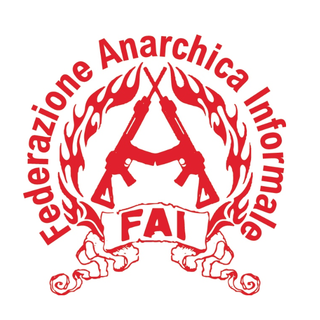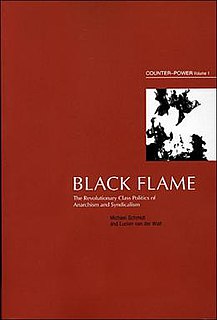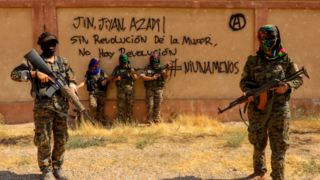Anarcho-communism, also known as anarchist communism, is a political philosophy and anarchist school of thought which advocates the abolition of the state, capitalism, wage labour, social hierarchies and private property in favor of common ownership of the means of production and direct democracy as well as a horizontal network of workers' councils with production and consumption based on the guiding principle "From each according to his ability, to each according to his needs". Some forms of anarcho-communism such as insurrectionary anarchism are strongly influenced by egoism and radical individualism, believing anarcho-communism to be the best social system for the realization of individual freedom. Most anarcho-communists view anarcho-communism as a way of reconciling the opposition between the individual and society.
Libertarian socialism, also referred to as anarcho-socialism, anarchist socialism, free socialism, stateless socialism, socialist anarchism and socialist libertarianism, is an anti-authoritarian, anti-statist and libertarian political philosophy within the socialist movement which rejects the state socialist conception of socialism as a statist form where the state retains centralized control of the economy. Overlapping with anarchism and libertarianism, libertarian socialists criticize wage slavery relationships within the workplace, emphasizing workers' self-management and decentralized structures of political organization. As a broad socialist tradition and movement, libertarian socialism includes anarchist, Marxist and anarchist or Marxist-inspired thought as well as other left-libertarian tendencies. Anarchism and libertarian Marxism are the main currents of libertarian socialism.

Errico Malatesta was an Italian anarchist and revolutionary socialist. He spent much of his life exiled from Italy and in total spent more than ten years in prison. Malatesta wrote and edited a number of radical newspapers and was also a friend of Mikhail Bakunin.
The history of anarchism is as ambiguous as anarchism itself. Scholars find it hard to define or agree on what anarchism means, which makes outlining its history difficult. There is a range of views on anarchism and its history. Some feel anarchism is a distinct, well-defined 19th and 20th century movement while others identify anarchist traits long before first civilisations existed.
Anarchism without adjectives, in the words of historian George Richard Esenwein, "referred to an unhyphenated form of anarchism, that is, a doctrine without any qualifying labels such as communist, collectivist, mutualist, or individualist. For others, [...] [it] was simply understood as an attitude that tolerated the coexistence of different anarchist schools".

Illegalism is a tendency of anarchism that developed primarily in France, Italy, Belgium and Switzerland during the early 1900s as an outgrowth of individualist anarchism. Illegalists embrace criminality either openly or secretly as a lifestyle. Illegalism does not specify the type of crime, though it is associated with theft and shoplifting.
Anarchism is generally defined as the political philosophy which holds the state to be undesirable, unnecessary and harmful as well as opposing authority and hierarchical organization in the conduct of human relations. Proponents of anarchism, known as anarchists, advocate stateless societies based on non-hierarchical voluntary associations. While anarchism holds the state to be undesirable, unnecessary and harmful, opposition to the state is not its central or sole definition. Anarchism can entail opposing authority or hierarchy in the conduct of all human relations.
Italian anarchism as a movement began primarily from the influence of Mikhail Bakunin, Giuseppe Fanelli, and Errico Malatesta. Rooted in collectivist anarchism, it expanded to include illegalist individualist anarchism, mutualism, anarcho-syndicalism, and especially anarcho-communism. It participated in the biennio rosso and survived Italian fascism. Platformism and insurrectionary anarchism were particularly common in Italian anarchism and continue to influence the movement today. The synthesist Italian Anarchist Federation appeared after the war, and autonomismo and operaismo especially influenced Italian anarchism in the second half of the 20th century.
The International Anarchist Congress of Amsterdam took place from 24 August to 31 August 1907. It gathered delegates from 14 different countries, among which important figures of the anarchist movement, including Errico Malatesta, Luigi Fabbri, Benoît Broutchoux, Pierre Monatte, Amédée Dunois, Emma Goldman, Rudolf Rocker, Christiaan Cornelissen, et al.
The following outline is provided as an overview of and topical guide to anarchism, generally defined as the political philosophy which holds the state to be undesirable, unnecessary and harmful, or alternatively as opposing authority and hierarchical organization in the conduct of human relations. Proponents of anarchism, known as anarchists, advocate stateless societies or non-hierarchical voluntary associations.
Egoist anarchism or anarcho-egoism, often shortened as simply egoism, is a school of anarchist thought that originated in the philosophy of Max Stirner, a 19th-century existentialist philosopher whose "name appears with familiar regularity in historically orientated surveys of anarchist thought as one of the earliest and best known exponents of individualist anarchism".
Giuseppe CiancabillaItalian pronunciation: [dʒuˈzɛppe tʃaŋkaˈbilla] was one of the important figures of the anarchist movement who immigrated to the United States in the late 19th century, along with F. Saverio Merlino, Pietro Gori, Carlo Tresca, and Luigi Galleani.

Informal Anarchist Federation (FAI) is an insurrectionary anarchist organization. It has been described by Italian intelligence sources as a "horizontal" structure of various anarchist groups, united in their beliefs in revolutionary armed action. Groups and individuals comprising the FAI act both as separate organizations and also under the FAI, and are known to format group campaigns. The FAI notably shares similar aims and ideals with Conspiracy of Fire Nuclei, the two often working in solidarity with each other, the SPF being known to announce solidarity with FAI in their communiques. The group has its roots in Italy, but, since 2012, has begun executing attacks in various countries across the world.

Black Flame: The Revolutionary Class Politics of Anarchism and Syndicalism is a book written by Lucien van der Walt and Michael Schmidt which deals with “the ideas, history and relevance of the broad anarchist tradition through a survey of 150 years of global history.”
Social anarchism is the branch of anarchism that sees individual freedom as interrelated with mutual aid. Social anarchist thought emphasizes community and social equality as complementary to autonomy and personal freedom. It attempts to accomplish this balance through freedom of speech, which is maintained in a decentralized federalism, with freedom of interaction in thought and subsidiarity. Subsidiarity is best defined as "that one should not withdraw from individuals and commit to the community what they can accomplish by their own enterprise and industry" and that "[f]or every social activity ought of its very nature to furnish help to the members of the body social, and never destroy and absorb them", or the slogan "Do not take tools out of people's hands".
Post-left anarchy is a recent current in anarchist thought that promotes a critique of anarchism's relationship to traditional leftism. Some post-leftists seek to escape the confines of ideology in general while also presenting a critique of organizations and morality. Influenced by the work of Max Stirner and by the Situationist International, post-left anarchy is marked by a focus on social insurrection and a diminution of leftist social organisation.
Synthesis anarchism, synthesist anarchism, synthesism or synthesis federations is a form of anarchist organization that seeks diversity upon its participants and tries to join anarchists of different tendencies under the principles of anarchism without adjectives. In the 1920s, this form found as its main proponents the anarcho-communists Voline and Sébastien Faure, bringing together anarchists of three main tendencies, namely individualist anarchism, anarchist communism and anarcho-syndicalism. It is the main principle behind the anarchist federations grouped around the contemporary global International of Anarchist Federations.

Insurrectionary anarchism is a revolutionary theory and tendency within the anarchist movement that emphasizes insurrection as a revolutionary practice. It is critical of formal organizations such as labor unions and federations that are based on a political programme and periodic congresses. Instead, insurrectionary anarchists advocate informal organization and small affinity group based organization. Insurrectionary anarchists put value in attack, permanent class conflict and a refusal to negotiate or compromise with class enemies.

Platformism is a form of anarchist organization that seeks unity from its participants, having as a defining characteristic the idea that each platformist organization should include only people that are fully in agreement with core group ideas, rejecting people who disagree. It stresses the need for tightly organized anarchist organizations that are able to influence working class and peasant movements.
Anarchism is the political philosophy which holds ruling classes and the state to be undesirable, unnecessary and harmful, or alternatively as opposing authority and hierarchical organization in the conduct of human relations.






